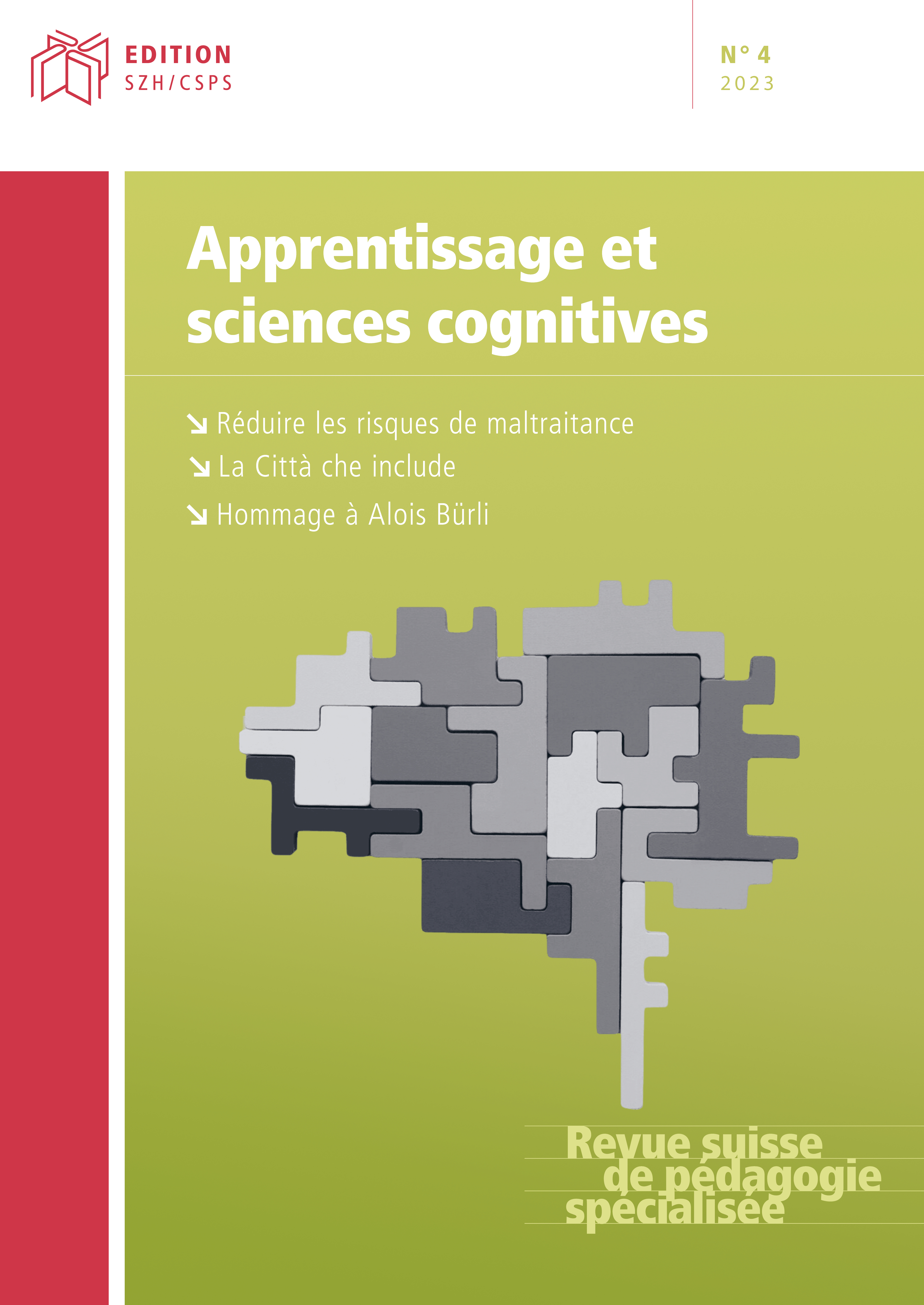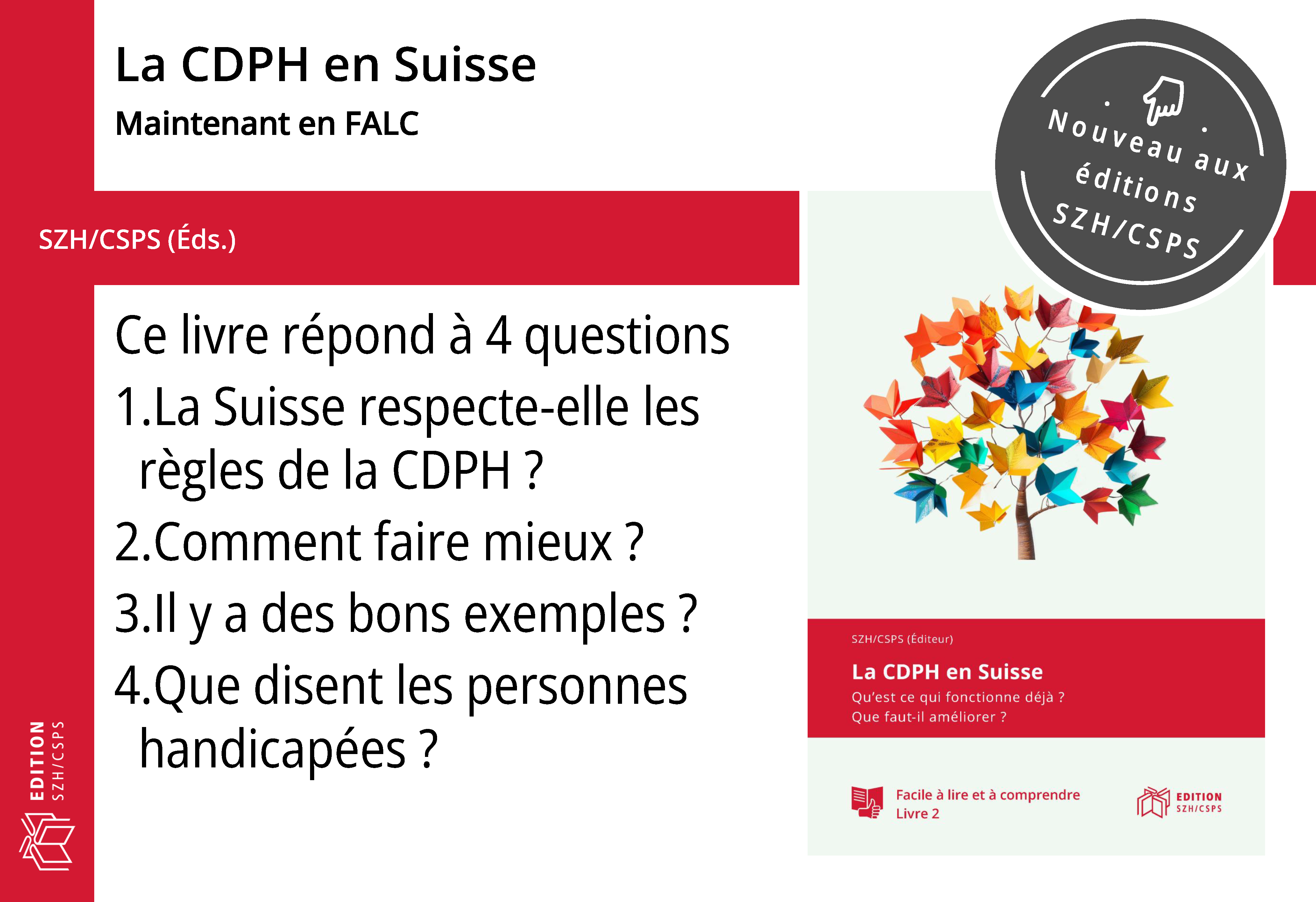La mémoire de travail : un élément clé pour la compréhension et la remédiation des difficultés d’apprentissage
DOI:
https://doi.org/10.57161/r2023-04-06Schlagworte:
Arbeitsgedächtnis, Intervention, Lernschwierigkeit, Schule, SchulerfolgAbstract
Das Arbeitsgedächtnis (AG) ist ein wichtiger Bestimmungsfaktor der Lernfähigkeit, insbesondere im schulischen Kontext. In diesem Artikel beschreiben wir die aktuellen theoretischen Kenntnisse über diese kognitive Funktion und heben ihre Abhängigkeit von anderen kognitiven Bereichen hervor, wie das im Langzeitgedächtnis gespeicherte Wissen, die Kontrolle der Aufmerksamkeit sowie der exekutiven Funktionen und die serielle Informationsverarbeitung. Wir diskutieren verschiedene Strategien, die dem Lehrpersonal behilflich sein können, die Lernfähigkeiten ihrer Schüler:innen zu optimieren angesichts der natürlichen oder der erhöhten Begrenzungen des AG.
Literaturhinweise
Alloway, T., Bibile, V., & Lau, G. (2013). Computerized working memory training: Can it lead to gains in cognitive skills in students? Computers in Human Behavior, 29(3), 632–638. https://doi.org/10.1016/j.chb.2012.10.023
Attout, L., & Majerus, S. (2015). Working memory deficits in developmental dyscalculia: The importance of serial order. Child Neuropsychology, 21(4), 432–450. https://doi.org/10.1080/09297049.2014.922170
Attout, L., Noel, M. P., & Majerus, S. (2014). The relationship between working memory for serial order and numerical development: a longitudinal study. Developmental Psychology, 50(6), 1667–1679. https://doi.org/10.1037/a0036496
Barrouillet, P., Bernardin, S., & Camos, V. (2004). Time constraints and resource sharing in adults' working memory spans. Journal of Experimental Psychology. General, 133(1), 83–100. https://doi.org/10.1037/0096-3445.133.1.83
Brock, J., & Jarrold, C. (2005). Serial order reconstruction in Down syndrome: evidence for a selective deficit in verbal short-term memory. Journal of Child Psychology and Psychiatry, 46(3), 304–316. https://doi.org/10.1111/j.1469-7610.2004.00352.x
Cardoso, C. O., Dias, N., Senger, J., Colling, A. P. C., Seabra, A. G., & Fonseca, R. P. (2018). Neuropsychological stimulation of executive functions in children with typical development: A systematic review. Applied Neuropsychology: Child, 7(1), 61–81. https://doi.org/10.1080/21622965.2016.1241950
Conners, F. A., Rosenquist, C. J., & Taylor, L. A. (2001). Memory training for children with Down syndrome. Down's syndrome, Research and Practice, 7(1), 25–33. https://doi.org/10.3104/reports.111
Cortese, S., Ferrin, M., Brandeis, D., Buitelaar, J., Daley, D., Dittmann, R. W., Holtmann, M., Santosh, P., Stevenson, J., Stringaris, A., Zuddas, A., Sonuga-Barke, E. J., European ADHD Guidelines Group [EAGG] (2015). Cognitive training for attention-deficit/hyperactivity disorder: meta-analysis of clinical and neuropsychological outcomes from randomized controlled trials. Journal of the American Academy of Child and Adolescent Psychiatry, 54(3), 164–174. https://doi.org/10.1016/j.jaac.2014.12.010
Emrich, S. M., Riggall, A. C., Larocque, J. J., & Postle, B. R. (2013). Distributed patterns of activity in sensory cortex reflect the precision of multiple items maintained in visual short-term memory. The Journal of neuroscience: the official journal of the Society for Neuroscience, 33(15), 6516–6523. https://doi.org/10.1523/JNEUROSCI.5732-12.2013
Gathercole, S. E., Woolgar, F., CALM Team, Kievit, R. A., Astle, D., Manly, T., & Holmes, J. (2016). How Common are WM Deficits in Children with Difficulties in Reading and Mathematics? Journal of applied research in memory and cognition, 5(4), 384–394. https://doi.org/10.1016/j.jarmac.2016.07.013
Hulme, C., Maughan, S., & Brown, G. D. (1991). Memory for familiar and unfamiliar words: Evidence for a long-term memory contribution to short-term memory span. Journal of Memory and Language, 30(6), 685–701. https://doi.org/10.1016/0749-596X(91)90032-F
Jaroslawska, A. J., Gathercole, S. E., Logie, M. R., & Holmes, J. (2016). Following instructions in a virtual school: Does working memory play a role? Memory & cognition, 44(4), 580–589. https://doi.org/10.3758/s13421-015-0579-2
Klingberg, T., Forssberg, H., & Westerberg, H. (2002). Training of working memory in children with ADHD. Journal of Clinical and Experimental Neuropsychology, 24(6), 781–791. https://doi.org/10.1076/jcen.24.6.781.8395
Kofler, M. J., Sarver, D. E., Harmon, S. L., Moltisanti, A., Aduen, P. A., Soto, E. F., & Ferretti, N. (2018). Working memory and organizational skills problems in ADHD. Journal of Child Psychology and Psychiatry, 59(1), 57–67. https://doi.org/10.1111/jcpp.12773
Kowialiewski, B., Van Calster, L., Attout, L., Phillips, C., & Majerus, S. (2020). Neural Patterns in Linguistic Cortices Discriminate the Content of Verbal Working Memory. Cerebral Cortex, 30(5), 2997-3014. https://doi.org/10.1093/cercor/bhz290
Leclercq, A. L., & Majerus, S. (2010). Serial Order Short-Term Memory Predicts Vocabulary Development: Evidence from a Longitudinal Study. Developmental Psychology, 46(2), 417–427. https://doi.org/10.1037/a0018540
Majerus, S. (2013). Language repetition and short-term memory: an integrative framework. Frontiers in Human Neuroscience, 7, Article 357. https://doi.org/10.3389/fnhum.2013.00357
Majerus, S. (2018a). Working memory treatment in aphasia: A theoretical and quantitative review. Journal of Neurolinguistics, 48, 157-175. https://doi.org/10.1016/j.jneuroling.2017.12.001
Majerus, S. (2018b). Chapitre 1. Rééducation des fonctions cognitives supérieures : revue critique des outils existants. In C. Seguin (Ed.), Rééducation cognitive chez l’enfant : Apport des neurosciences, méthodologie et pratiques (pp. 243-268). De Boeck Supérieur. https://doi.org/10.3917/dbu.segui.2018.01.0243
Majerus, S., Attout, L., D’Argembeau, A., Degueldre, C., Fias, W., Maquet, P., Martinez Perez, T., Stawarczyk, D., Salmon, E., Van der Linden, M., Phillips, C., &Balteau, E. (2012). Attention supports verbal short-term memory via competition between dorsal and ventral attention networks. Cerebral Cortex, 22(5), 1086–1097. https://doi.org/10.1093/cercor/bhr174
Majerus, S., & Van der Linden, M. (2003). Long-term memory effects on verbal short-term memory : A replication study. British Journal of Developmental Psychology, 21(2), 303–310. https://doi.org/10.1348/026151003765264101
Majerus, S., Van der Linden, M., Braissand, V., & Eliez, S. (2007). Verbal short-term memory in children and adults with a chromosome 22q11.2 deletion. A specific deficit in serial order retention capacities? American Journal on Mental Retardation, 112(2), 79–93. https://doi.org/10.1352/0895-8017(2007)112[79:VSMIIW]2.0.CO;2
Martinez Perez, T., Majerus, S., Mahot, A., & Poncelet, M. (2012). Evidence for a specific impairment of serial order short-term memory in dyslexic children. Dyslexia, 18(2), 94–109. https://doi.org/10.1002/dys.1438
Melby-Lervag, M., Redick, T. S., & Hulme, C. (2016). Working Memory Training Does Not Improve Performance on Measures of Intelligence or Other Measures of “Far Transfer”: Evidence From a Meta-Analytic Review. Perspectives in Psychological Sciences, 11(4), 512–534. https://doi.org/10.1177/1745691616635612
Ordonez Magro, L., Majerus, S., Attout, L., Poncelet, M., Smalle, E. H. M., & Szmalec, A. (2021). Do serial order short-term memory and long-term learning abilities predict spelling skills in school-age children? Cognition, 206, 104479. https://doi.org/10.1016/j.cognition.2020.104479
Paananen, M. A., Aro, T., Närhi, V., & Aro, M. (2017). Group-based intervention on attention and executive functions in the school context. Educational Psychology, 38(7), 859-876. https://doi.org/10.1080/01443410.2017.1407407
Smith, E. A. (2015). Exploring the nature of verbal short-term memory in Down syndrome and developing potential routes for intervention [Thèse de doctorat non publiée]. University of Bristol..
Swanson, H. L., Kehler, P., & Jerman, O. (2010). Working memory, strategy knowledge, and strategy instruction in children with reading disabilities. Journal of Learning Disabilities, 43(1), 24–47. https://doi.org/10.1177/0022219409338743
Todd, J. J., & Marois, R. (2004). Capacity limit of visual short-term memory in human posterior parietal cortex. Nature, 428(6984), 751–754. https://doi.org/10.1038/nature02466
Van der Molen, M. J., Huizinga, M., Huizenga, H. M., Ridderinkhof, K. R., Van der Molen, M. W., Hamel, B. J., Curfs, L. M., & Ramakers, G. J. (2010). Profiling Fragile X Syndrome in males : strengths and weaknesses in cognitive abilities. Research in developmental disabilities, 31(2), 426–439. https://doi.org/10.1016/j.ridd.2009.10.013
Veröffentlicht
Zitationsvorschlag
Ausgabe
Rubrik
Lizenz
Copyright (c) 2023 Steve Majerus

Dieses Werk steht unter der Lizenz Creative Commons Namensnennung 4.0 International.



